We have covered Visual Studio Code before so you must know how much of an awesome code editor it is. While VS Code is open source freeware, its source code is only available on Microsoft’s official GitHub repo and its downloads are licensed under a closed source license which contains telemetry so you’ll be happy with the app we have for you today.
VSCodium is a tracking-free, free and open source build of Microsoft’s Visual Studio Code created so that developers will not have to build VS Code from source which contains telemetry/trackers.
This fit is accomplished by using special scripts to clone the vscode repo, build it from source, and then upload the resulting binaries to VSCodium’s GitHub releases free of telemetry passes.
With that being said, VSCodium is a replica of Visual Studio Code and thus, works in the same way with all the features and support present in its parent project. Except for the app icon – that’s different.
Features in VSCodium
- Free to use
- Cross-Platform: Available on Windows, GNU/Linux, and Mac.
- Open source with source code available on GitHub.
- Native support for several languages.
- Additional functionality using extensions.
- IntelliSense and smart code completion.
- An advanced and robust built-in debugger.
- Native support for Git.
You know the feature list in VS Code is virtually inexhaustible. The same goes for VSCodium.
How to Install VSCodium on Linux
Follow these steps to install VSCodium on any Debian-based distro like Ubuntu. Take note of the pipe "|" symbol used to join the commands.
Add its repo’s GPG key.
$ wget -qO - https://gitlab.com/paulcarroty/vscodium-deb-rpm-repo/raw/master/pub.gpg | sudo apt-key add -
Add the repo to your system.
$ echo 'deb https://gitlab.com/paulcarroty/vscodium-deb-rpm-repo/raw/repos/debs/ vscodium main' | sudo tee --append /etc/apt/sources.list.d/vscodium.list
Update your PC and install the app.
$ sudo apt update && sudo apt install vscodium
VSCOdium is installed by default on ParrotOS and if it’s not installed on your system you can install it with the simple code:
$ sudo apt update && apt install vscodium
On Fedora / Centos / OpenSUSE, you can install VSCodium using following commands.
Add the GPG key of the repository and install VSCodium as shown.
-------- On Fedora/CentOS/RHEL -------- # dnf config-manager --add-repo https://gitlab.com/paulcarroty/vscodium-deb-rpm-repo/raw/repos/rpms/ # dnf install vscodium
-------- On OpenSUSE/SUSE -------- # zypper addrepo -t YUM https://gitlab.com/paulcarroty/vscodium-deb-rpm-repo/raw/repos/rpms/ vscodium_mirror_on_gitlab # zypper in vscodium
If you like, you can transfer your tools and preferences from VS Code to VSCodium using the instruction manual here. Are you using a different OS? See how to install VSCodium on your system here.
What do you think about VSCodium? I imagine that developers who didn’t want to fork Visual Studio Code because of the info that Microsoft tracks will happily jump at VSCodium. Tell us what you think in the comments section below.


